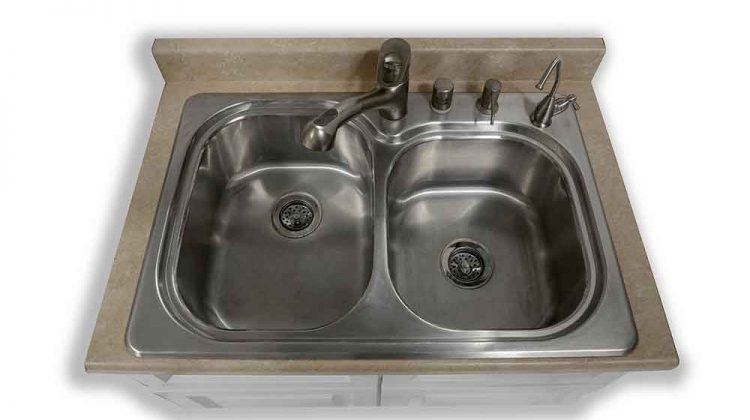
Stainless steel kitchen sinks are an important fixture in the kitchen. But you probably already know that, right?
There are many types of stainless steel sinks out there, so how do you choose?
Well, start by looking at the gauge. Gauge refers to the thickness of the steel that was used to make the sink. If your sink is not thick enough, it won’t be durable enough. And if it’s too thick, then it’ll be too heavy to sit safely on regular kitchen cabinets.
If you’re now wondering what gauge stainless steel sink is best for your house, then ask no more. We have all the answers for you right here.
Table of Contents
Steel Gauge and Steel Thickness
When the gauge comes to mind, just remember this: the lower the gauge number, the thicker and more durable it is.
Contrary to common sense, higher gauge numbers indicate a thinner steel material. For example, a 24-gauge steel is thinner than a 16-gauge steel.
That is because the measure actually comes from fractions. When we say 24 gauge, we actually mean that the material has 1/24 inches of steel.
And since 1/24 inches of steel has less steel than 1/16 inches of steel, the rule of hand is that the lower the gauge, thicker the steel.
In summary:
Low Gauge Number = Thick Steel (More Durable, Will Not Get Dents, Produces More Noise)
High Gauge Number = Thin Steel (Less Durable, Will Get Dents, Produces More Noise)
Advantages of A Thick Stainless Steel Sink
No one buys a sink with the thought of having it replaced in a few months. It’s a big hassle to install kitchen sinks in place. And that is why we need to do it properly the first time.
Thus, buying steel of a higher gauge is better for the long run. So, here are some of the advantages outlined below.
Noise Dampening
Noise dampening is important because it can make washing the dishes a better experience. It keeps the house silent and saves you from taking those extra steps in being cautious while you’re doing the dishes.
Manufacturers can install sound dampeners in the underside of sinks, and this works especially well with thick gauge undermount kitchen sinks.
Noise dampening pads and coatings cling better on thick and dense steel than on lighter and thinner stainless steel.
Damage Resistance
Thick steel is more densely packed, so when you drop a knife on a sink that has a high gauge, you are less likely to make dents on it.
Thinner steel would be more likely to get pierced, or at least, get dented if a sharp object falls into it.
Appearance
Thicker steel just looks better than thinner ones. This is because it’s easy to bend them to different shapes without ruining them. That is why you’ll find that all the sturdy and good-looking kitchen stainless sinks are actually of a gauge that is towards the lower side in the gauge scale.
18 Gauge Vs 20 Gauge Stainless Steel Sinks
Popular choices for stainless steel include an 18-gauge and a 20-gauge steel. Can you tell from the numbers which steel is thicker? We hope you can.
In accordance to that, we can also understand some of the characteristics of the two steel gauges.
18 gauge will not get as many dents as 20 gauge will. It is thicker, so it will require more force of impact to get bent accidentally. So, if you want a durable sink in the kitchen, better go with the 18-gauge stainless steel.
Another benefit of the 18-gauge is that it will muffle the sounds of dishes and pans when they are hurriedly kept in the sink. The 20-gauge is thin, and therefore, it has a lower noise absorbing ability. The 20-gauge sink will be more noisy than the 18-gauge steel.
In terms of appearance and quality, the thick 18-gauge steel will also be much better than the 20-gauge stainless.
Recommended Gauge for Residential Kitchen Sinks
There are basically two options for you in domestic kitchen sinks – an 18-gauge sink or a 16-gauge sink.
But the 16-gauge might be slightly more expensive than the 18-gauge one. If the difference is not too high a jump for you, then it’s better to go with the 16-gauge. Lower the better, of course.
However, the difference in the structure and durability of these two gauge levels is not much. They basically provide the same value in terms of longevity, functionality, and appearance.
There will be sinks with higher gauge values, like 20, 22, and so on. But we’d tell you to not bother with those if you are looking to keep your sink for a long time.
What Gauge Stainless Steel Sink Is Best for Commercial Use
Commercial buildings have different standards and requirements than residential buildings. Not only do they require durable materials, but those materials also need to be cost-efficient, so that the commercially trading businesses who pay for it are not unwilling to pay for the building essentials.
Considering many such factors and some in-field surveys, we have come to conclude that two gauges are very compatible for commercial use. They are 14-gauge and 12-gauge stainless steel.
Again, to clarify, 12 gauge is thicker than 14-gauge steel.
The reason these two gauges are suitable is because they are both extremely durable and will remain functional for years. Thus, they are well recommended for commercial use.
Conclusion
So, that’s the end of the article here.
And like we mentioned earlier, kitchen sinks are vital to the proper functioning of any active household.
But with the knowledge of what gauge stainless steel sink is best, we hope you’ll be able to confidently walk into the store and know your pick from the several options available right away. So, go and buy a stainless steel sink for your kitchen right now.
